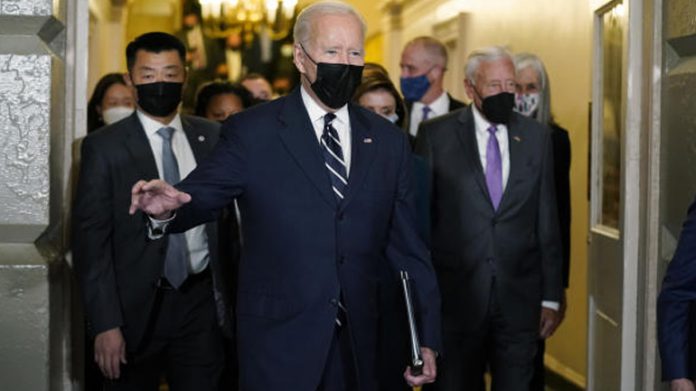Washington — President Biden is unveiling a revamped social policy and climate change plan Thursday that the White House expects will make sweeping changes to American society and hopes to pass with overwhelming Democratic Party support.
The White House released details of the plan as the president prepared to leave Thursday for Europe to attend two major global summits and leave the work of passing the new $1.75 trillion proposal, plus the bipartisan infrastructure plan awaiting final passage in the House, up to top congressional leaders who’ve struggled to wrangle the disparate wings of the Democratic Party over the course of the protracted negotiations.
“We are confident that this historic framework will earn the support of every Democratic senator and pass the House,” a senior administration official told reporters early Thursday.
A congressional aide familiar with the ongoing negotiations said Senators Joe Manchin of West Virginia and Kyrsten Sinema of Arizona, two key moderate Democrats whose support for the plan is crucial, have “loosely” agreed to a general, broad framework, but will not yet commit to supporting the bill.
Many Democrats, including progressives in the House, have insisted on seeing the legislative text of the measure before agreeing to pass a more targeted $1 trillion bipartisan infrastructure bill, which revamps the nation’s roads, bridges, railways and water lines.
The president met with House Democrats on Capitol Hill for about an hour on Thursday morning and plans to address the nation around 11:30 a.m. ET, before departing for Rome, where he is scheduled to arrive later tonight ahead of a Friday meeting with Pope Francis in Vatican City.
Leaving the meeting at the Capitol, the president told reporters, “I think we’re going to be in good shape.”

If enacted as introduced on Thursday, aides say Mr. Biden’s plan would expand early childhood education for at least six years by providing universal preschool for 3- and 4-year-olds; dramatically drive down the country’s greenhouse gas emissions in the next nine years; provide first-of-its-kind tax breaks to encourage the widespread use of electric vehicles and the installation of solar panels on American homes; expand government-backed health-care coverage for at least four years; and pay for the plan by enacting new taxes on the nation’s wealthiest.
The price tag could rise to $1.85 trillion with the inclusion of a $100 billion provision that aims to reform the nation’s immigration system. But previous immigration proposals have been knocked down by the Senate parliamentarian, as they did not comply with the rules governing the process Democrats are using to fast-track the package through the Senate, called reconciliation. The White House said immigration reforms will be consistent with reconciliation rules.
Left out of the framework were plans to offer 12 weeks of paid family leave and free community college, as well as allowing Medicare to negotiate prescription drug prices.
Aides working with the president on the legislation described it as “transformative” and “historic” — even though it is expected to cost far less than the original $3.5 trillion proposal Mr. Biden unveiled earlier this year.
The plan as written contains $555 billion in climate and clean energy investments and would cut more than a gigaton of greenhouse gas emissions by 2030 — a roughly 50% reduction compared to 2005 levels, aides said. The legislation would provide tax credits to Americans buying new electric vehicles that could, according to administration officials, provide up to $12,500 in incentives to some families to drop gas-guzzling vehicles. New tax incentives designed to encourage the installation of solar panels on American homes will also be offered.
Elements of the legislation regarding health care would expand coverage to 7 million more uninsured Americans, aides said, and lower premiums by an average of $600 per person for more than 9 million Americans who purchase insurance through the Affordable Care Act’s marketplace.
Mr. Biden’s revised framework would also expand Medicare coverage to include hearing services, though some Democrats pushed for the plan to expand the health care program for seniors to cover dental and vision.
It also extends through 2022 the expanded child tax credit, which the White House says will provide more than 35 million households up to $3,600 in tax cuts per child. The expanded child tax credit was included in Democrats’ $1.9 trillion COVID relief plan enacted this year.
A mix of new taxes and government fees would be used to pay for the sweeping plan, including a 15% minimum tax on the earnings of the nation’s largest corporations and a surtax on earnings of multimillionaires and billionaires. A proposed tax on the nation’s roughly 700 billionaires was rejected Wednesday by moderates concerned about its targeted approach and by some Democrats with tax-writing experience concerned it might not pass legal muster.
The $1.75 trillion framework unveiled by the White House is the culmination of months of negotiations between Democrats over the size and scope of Mr. Biden’s domestic policy package.
Because the party holds 50 seats in the Senate, passage of the plan hinges on support from all Democrats in the upper chamber and made Manchin and Sinema central figures in the talks. Democrats are using a legislative tool called reconciliation to fast-track the legislation through the Senate and allow it to pass without Republican support.
The two moderate senators had expressed concern over the initial $3.5 trillion price tag for the initial measure put forth by the president, which led Democratic leaders to trim the package.




